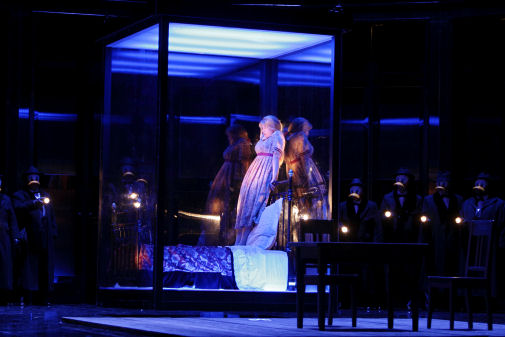Other Links
Editorial Board
-
Editor - Bill Kenny
-
Deputy Editor - Bob Briggs
Founder - Len Mullenger
Google Site Search
SEEN
AND HEARD INTERNATIONAL OPERA REVIEW
Verdi, Rigoletto:
(Second Cast) Soloists, Chorus and Orchestra
of Finnish National Opera, Conductor: Luke Dollman.
Finnish National Opera, Helsinki 23.1.2009 (BK)
Director: Georg Rootering
Sets and Costumes: Mark Väisänen
Lighting: Timo Alhanen
Cast:
Duke of Mantua: Mika Pohjonen
Rigoletto: Raimo Laukka
Gilda: Sirkka Lampimäki
Sparafucile: Hannu Forsberg
Maddalena: Riika Rantanen
Giovanna: Salla Leponiemi
Count of Monterone: Robert McLoud
Marullo: Markus Nieminen
Borsa: Pertti Mäkelä
Count Ceprano: Kai Valtonen
Countess Ceprano: Riitta Ullgrén
Court Official: Ari Hosio
Page: Meriliinu Haataja

Sirkka Lampimäki as Gilda
Premiered in November 2008 and set
more or less in the present day, this production of Rigoletto
depicts a sordid and vicious society in which nothing has value
except wealth and power, and where
everyone must share the same
attitudes in order to survive. It opens with a party, in which Monterone’s daughter is seen dancing inside
a glass cage suspended above
the heads of the Duke and his courtiers, having
recently been
seduced by the Duke himself. She bears a resemblance to Gilda, whose
own space, when she appears, is a bed contained within the same
glass cage. The inference is clear and from the beginning, the
miserable tale takes place in half light, with predominantly grey
scenery. A large and
prominent revolving wall with many doors
contains the changing sets to show the
locations of each scene.
These images are powerful yet under these circumstances, the only
true mystery in the
plot is why the Jester brings
his daughter to Mantua in the first place, rather than why he has kept her
carefully locked up for so long. The answer may
lie in the generalised bewilderment
caused by life in a society in which everything is corrupted
or corruptible. Faulty judgement
is inevitable when living
the life that Rigoletto does, even when
blessed with a child as precious to him as Gilda.
The production forbids
seeing the Duke as a cheery sort of lad,
simply having a good time – and that is all to the good. The seduction
of Gilda can’t be dismissed as
a mutual act in any way – she might be in
love, but he remains an aristocratic trader in women,
devoid of charm or good
intention. From this point of view, with
everything weighted towards the grim,
perhaps just a minute
or two of doubt would
have been welcome; enough at least to let the
audience wonder if the outcome could ever have been different.
Or perhaps this performance needed better
direction of the actors
playing almost
all of the roles to bring
out more tragedy rather than
mere squalor, given the
undoubted imagination of the setting.
In any event, what we had
from the second cast was a group of
principals who could
largely sing their roles well enough, but who were
unable to put across very much of the emotion expressed in the music and text. The
Count of Ceprano cursed Rigoletto so feebly that it would take an
immensely paranoid personality to feel
either hated or threatened; similarly the jester’s own fury and grief was
unusually
lacking in intensity.
Adding to this problem
was a strange imbalance between singers and orchestra,
caused it seemed, by the impressive but complicated staging, but
leading to
a persistent sense of hearing the singers from a distance. At other moments the orchestra overwhelmed the voices
completely, leaving an
uncomfortable feeling of disharmony
between pit and stage.
Amongst the singers, Hannu Forsberg as Sparafucile and Riikka
Rantanen as his sister Maddalena stood out (something which was
confirmed the next night when Riikka Rantanen took the lead in
Daddy’s Girl of
which a review will soon follow).
Sirkka Lampimäki as Gilda made a
poor start, her voice sounding weak
and with a pronounced wobble, but she improved by the time she came
to ‘Caro Nome’ and strengthened as the evening went on. Mika Pohjonen was a full-voiced Duke, but seemed unable to sustain the
necessary power through the opera, becoming less than convincing in
‘La donna è mobile’.
Raimo Laukka sang Rigoletto well. He has a
genuinely beautiful voice, but
untypically was unable on this occasion to bring any great
conviction to his role
so that his performance felt oddly passionless.
In all, this
was a production where stronger direction of the singer
- actors
would have better balanced the powerful and disturbing setting, and
where the excellent orchestra of FNO felt out of balance with the
singers whom it usually complements with both
consummate skill and commitment.
Bill Kenny
Picture © Heikki Tuuli
Back
to Top
Cumulative Index Page
